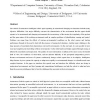Free Online Productivity Tools
i2Speak
i2Symbol
i2OCR
iTex2Img
iWeb2Print
iWeb2Shot
i2Type
iPdf2Split
iPdf2Merge
i2Bopomofo
i2Arabic
i2Style
i2Image
i2PDF
iLatex2Rtf
Sci2ools
ISCI
2002
2002
Intelligent learning and control of autonomous robotic agents operating in unstructured environments
The control of autonomous intelligent robotic agent operating in unstructured changing environments includes many objective difficulties. One major difficulty concerns the characteristics of the environment that the agent should operate in. In unstructured and changing environments the inconsistency of the terrain, the irregularity of the product and the open nature of the working environment result in complex problems of identification, sensing and control. Problems can range from the effects of varying environmental conditions on the robot sensors and traction performance through to the need to deal with the presence of unexpected situations. Another major challenge is the large amounts of uncertainty that characterises real-world environments. On the one hand, it is not possible to have exact and complete prior knowledge of these environments. On the other hand, knowledge acquired through sensing is affected by uncertainty and imprecision. The quality of sensor information is influ...
| Added | 22 Dec 2010 |
| Updated | 22 Dec 2010 |
| Type | Journal |
| Year | 2002 |
| Where | ISCI |
| Authors | Hani Hagras, Tarek M. Sobh |
Comments (0)

